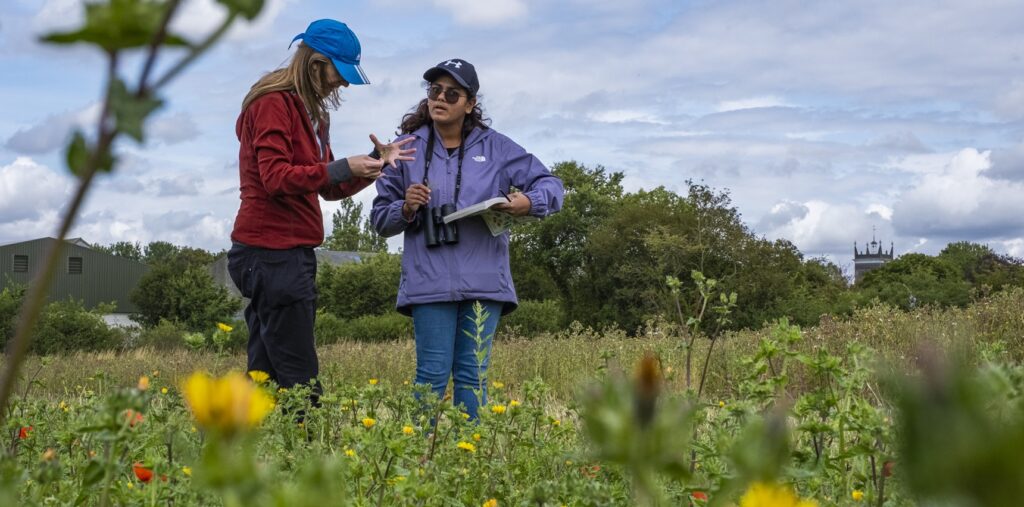Hundreds of UK farmers, landowners and volunteers have helped give the gift of hope to Turtle Doves this year, working with Operation Turtle Dove to provide better nesting and feeding habitat for the rare birds, across Suffolk and beyond.
Operation Turtle Dove is a science-led conservation project aimed at improving the future of the UK’s Turtle Doves.
Changes to the farmed landscape have made it increasingly difficult for farmland birds, including Turtle Doves, to find food and suitable nesting habitat. Recently released data shows that farmland bird numbers have fallen by over 60% across the UK since the 1970’s but targeted conservation work in partnership with farmers and landowners shows that we can reverse these declines, as demonstrated by Cirl Bunting and Stone-curlew being brought back from the brink of extinction in the UK.
The Operation Turtle Dove partnership, led by the RSPB, Pensthorpe Conservation Trust, Natural England, and Fair to Nature has been testing Turtle Dove conservation methods to be sure that the formula for success works. Creating feeding areas, maintaining dense scrub and hedgerows as nesting sites, and providing seed food directly, have all been shown to benefit Turtle Doves in focused trials. Now these tools are being carefully rolled out by expert staff to improve the fortunes of these summer visitors right across the South East and East of England.
The team of eight RSPB Turtle Dove advisors have been working hard all summer, supporting farmers, volunteers, and communities in the Turtle Dove’s remaining breeding strongholds to create the perfect nesting and feeding conditions.
Dense scrub and hedgerows that have the potential to attract breeding birds have been identified and protected and new nesting habitat created, while new ponds have been created for drinking and washing. Specially designed feeding plots and carefully crafted seed mixes provide the perfect banquet for the hungry birds when they arrive after their 2,500-mile migration from sub-Saharan Africa; across France, Spain and Portugal. This ensures that they can refuel quickly and start breeding, with some pairs raising multiple broods over the summer.
The Operation Turtle Dove team worked with over 260 farm holdings and a further 107 land managers throughout 2023 to create the perfect conditions for the iconic birds. Over 360 Turtle Dove feeding plots were created in 2023, over 100 more than the number created in the previous year and the number of people volunteering with Operation Turtle Dove through monitoring and project delivery work to help save the species has risen by 50% this year too.
Mike Shurmer, Head of Species for RSPB England, said: “The ambition of the communities we work with through Operation Turtle Dove to help save these iconic birds is nothing short of amazing, and if we continue with this momentum, it won’t be long before we can expect to see Turtle Dove numbers starting to rise across the UK.
“The habitat creation we are delivering with farmers and land managers through Operation Turtle Dove is key to improving the fortunes of these incredible birds, as numbers of potential breeding birds arriving here are likely to increase over the next few years. We are now in the third consecutive year of a Turtle Dove hunting ban along the Western European Flyway and – thanks to these two conservation approaches working hand in hand – it’s amazing to hear about birds returning to breed in parts of South East and Eastern England after the hard work and dedication of so many land managers and communities.”
Rebecca Pringle of Natural England
Agricultural changes here at home have caused a loss of suitable habitat for the birds that make it back to raise the next generation, leaving just an estimated 2,100 breeding territories remaining in the UK according to the 2021 National Turtle Dove survey.
Dean Cornish, Operation Turtle Dove survey volunteer, added: “While surveying in Cambridgeshire and Bedfordshire for Operation Turtle Dove in 2022 and 2023, it was clear that a lot of the habitat around the survey area could easily be improved for Turtle Doves. The work Operation Turtle Dove has been doing to create habitat with landowners following the National Surveys should mean that we will see far more positive results in the next National Turtle Dove Survey planned for 2026!”
Creating farmland habitat features – from hedgerows to ponds and flower-rich planting– even in gardens and local greenspaces can benefit Turtle Doves on their return to the UK. A whole host of other rare wildlife in the local area, such as Grey Partridge, Nightingale or Yellowhammer can benefit from Turtle Dove friendly habitat too. To find out more about how the project is working to save Turtle Doves in the UK, and how you can get involved, visit operationturtledove.org.





